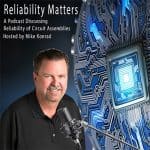
An Interview with Ricky Smith
This week’s guest is Ricky Smith, CMRP. Ricky joins the Masterminds in Maintenance podcast to discuss his journey of creating asset reliability and process reliability with his maintenance teams.
Your Reliability Engineering Professional Development Site

This week’s guest is Ricky Smith, CMRP. Ricky joins the Masterminds in Maintenance podcast to discuss his journey of creating asset reliability and process reliability with his maintenance teams.
by James Kovacevic Leave a Comment

Planning and scheduling maintenance and reliability programs takes a bit of a work but implementing that plan takes real effort and that’s where the project managers come in. They are the ones who define the scope of the plan and come with estimates in terms of budget and time. Project planners usually have a singular responsibility and that is to divide the work into a group of activities. These activities are part of major interdependent processes and there are always risks involved that need to be identified and addressed at the very start. It is very difficult to get the results without proper planning and management.
In this episode, we covered:

Kirk and Fred discussing the common response from design engineers when a weakness is found in HALT that is well outside the specifications
ᐅ Play Episode
by Tim Rodgers Leave a Comment

Tim interviews Andrew Russell, a bit of the history of science and technology, and the upcoming Maintainers III conference.

Kirk and Fred discussing a little of the history of Kirk’s working with Dr. Gregg Hobbs, PE, the former IEEE/CPMT technical group Accelerated Stress Testing and Reliability and the future of promoting and teaching the use of HALT and HASS.
ᐅ Play Episode

This week’s guest is Rob Kalwarowsky of Rob’s Reliability Project. Rob joins the Masterminds in Maintenance podcast to discuss the importance of learning on the ground from the maintenance and reliability technicians who know your assets the best. [Read more…]
by James Kovacevic Leave a Comment

Behind a successful reliability program, there’s always a great plan for implementation. This is something that maintenance planners handle. They are the ones who create job plans, strategize those plans, and then develop procedures to implement them with success. The scope of a maintenance planner’s job is flexible, so there are different type roles that a planner or a planner and scheduler plays depending upon the type of the organization they are working for. Some of the maintenance planners receive proper training while the others just get into the process as they go along.
In this episode, we covered:
by Robert Kalwarowsky Leave a Comment

Welcome to Rob’s Reliability Project, I’m Rob Kalwarowsky. On this week’s episode, I welcome on Sanya Mathura from Strategic Reliability Solutions. We talk about lubricant degradation mechanisms, oxidation and what oil analysis tests we should be looking at to identify when to change oil.
If you haven’t yet, check out my website robsreliability.comand sign up for the weekly reliability newsletter with bonus content. If you like the show, please tell your colleagues about it and follow Rob’s Reliability Project on LinkedIn and YouTube.
Finally, if there are any topics, guests you’d like to hear from, questions you want answered, or if you’d like to appear on the podcast, email me at robsreliabilityproject@gmail.com
If you haven’t signed up for my weekly reliability newsletter with extra exclusive content, go to http://robsreliability.com/email-list/ and sign up!
Check out UpKeep – http://www.robsreliability.com/upkeep/
Follow Sanya Mathura on LinkedIn – https://www.linkedin.com/in/sanya-mathura-362438129/
Follow Rob’s Reliability Project on LinkedIn – https://www.linkedin.com/company/robsreliabilityproject/
Follow Rob’s Reliability Project on Facebook – https://www.facebook.com/robsreliabilityproject/
Music by Jahzzar Songs: Look Inside and Circles Licensed under a Creative Commons Attribution-ShareAlike 3.0 International License.
by Mike Konrad Leave a Comment

A conversation with Teradyne’s Manager of Reliability Mark Levin and Senior Software Engineering Manager Jon Bodin about reliability, DFM, and their new book “Improving Product Reliability and Software Quality: Strategies, Tools, Process and Implementation”, 2nd Edition. The book is available here: https://tinyurl.com/y2f3nhav
by James Kovacevic Leave a Comment

RCA is one of the most basic yet most important of the processes in a reliability program. RCA isn’t just about solving a problem or fixing an error in your system. It is more than just finding a single root causes. When a problem occurs, there can be more than one reasons why that occurred in the first place. RCA helps us reduce the risk of that problem to a level that is acceptable to the organization. It is always a systemic and latent approach that takes time and should be done more often rather than just doing it when a problem has already occurred.
In this episode, we covered:

This week’s guest is Peter Funk, Reliability Manager at Rehrig Pacific Company.
Listen in on how Rehrig’s maintenance team evolved, and how Peter was able to increase knowledge sharing within their maintenance organization. [Read more…]
by Christopher Jackson Leave a Comment

Chris and Fred discuss the question posed to us by one of our listeners regarding the ‘flat’ bottom of the ‘bathtub curve.’ Just a bit of background – the ‘bathtub curve’ represents the hazard rate of a system. That is, it helps us understand the probability that a product that works ‘now’ will fail. The ‘flat’ part of the curve is often cited as the ‘random’ part of the curve where failure is caused by environmental overstress conditions. So how do we test for this part of the curve? … but hang on – is the ‘bathtub curve’ even a thing? Is it even relevant for the useful life of a product? If this intrigues you, listen to this podcast!
ᐅ Play Episode
by Christopher Jackson Leave a Comment

Chris and Fred discuss one of the most popular interpretations of maintainability which is based on how long it takes to maintain something. We see so many textbooks and guides that focus on this metric as the only maintainability measure. But is this really all that matters? What about the number of technicians required? … the number of tools required? … the training required for these technicians? … the mass of these tools? Does reliability matter? Yes to all these things. But how does they relate to the time-based definition? They don’t. Listen to this podcast to learn more.
ᐅ Play Episode
by Robert Kalwarowsky Leave a Comment

Welcome to Rob’s Reliability Project, I’m Rob Kalwarowsky. On this week’s episode, I welcome on Drew Welch from Resilient Reliability. We talk about how 39% of plants don’t use a CMMS, why people using a paper system should move to a mobile solution and why the excuses companies make to stay with paper aren’t justifiable.
If you haven’t yet, check out my website robsreliability.comand sign up for the weekly reliability newsletter with bonus content. If you like the show, please tell your colleagues about it and follow Rob’s Reliability Project on LinkedIn and YouTube.
Finally, if there are any topics, guests you’d like to hear from, questions you want answered, or if you’d like to appear on the podcast, email me at robsreliabilityproject@gmail.com
If you haven’t signed up for my weekly reliability newsletter with extra exclusive content, go to http://robsreliability.com/email-list/ and sign up!
Check out UpKeep – http://www.robsreliability.com/upkeep/
Follow Drew Welch on LinkedIn – https://www.linkedin.com/in/drewwelchpflugerville/
Follow Rob’s Reliability Project on LinkedIn – https://www.linkedin.com/company/robsreliabilityproject/
Follow Rob’s Reliability Project on Facebook – https://www.facebook.com/robsreliabilityproject/
Music by Jahzzar Songs: Look Inside and Circles Licensed under a Creative Commons Attribution-ShareAlike 3.0 International License.
by James Kovacevic Leave a Comment

Cyber security can be a significant issue why your assets are not working as they are supposed to and you face more downtime than expected. When you use network enabled systems, there are a lot of things on the internet that can cause damage to your system. Viruses such as malwares, ad-wares, and other harmful software leave your asset vulnerable to all sorts of attacks. If you are a leading organization in the industry, your systems can be exposed to hackers as well. So, there are a lot of aspects that an organization needs to look at when installing an industrial system in the facility.
In this episode, we covered:
 Ask a question or send along a comment.
Please login to view and use the contact form.
Ask a question or send along a comment.
Please login to view and use the contact form.